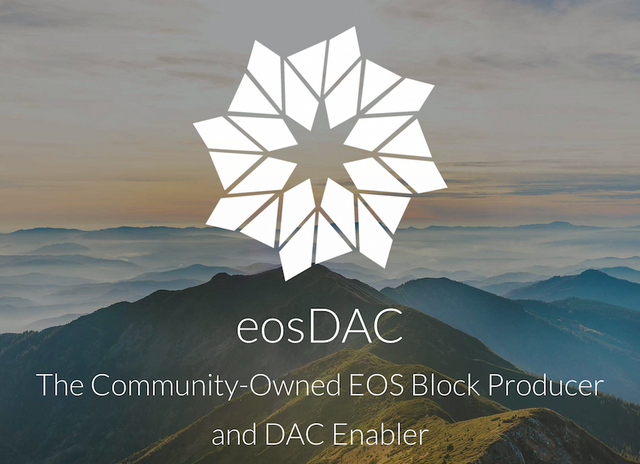The DAC Chain Initiative : Announcing an Exploration into How Usage of EOS Side Chains, and Separate Chains, May Create Benefits for Decentralized Autonomous Communities

A Decentralized Autonomous Community (DAC) is governed by its constitution, which is encoded in smart contracts on a blockchain.
This revolutionary concept allows groups to come together as a cooperative and benefit from their joint efforts.
eosDAC is an evolving Decentralized Autonomous Community focused on Eosio Block Production and serving the Eosio software based communities worldwide. In doing this, eosDAC is creating the tools and smart contracts it needs to function but it also is building these to help other DACs thrive.

eosDAC firmly believes that the Eosio software is the best available platform for DACs to run on. However, through many conversations with the EOS community, it is clear that there are a number of challenges facing would be DACs, especially with respect to running on the EOS Mainnet.
Therefore, in line with our mission as the DAC enabler, eosDAC have decided to conduct various activities, and experiments, to analyze the benefit of alternative Eosio chains for DACs to test, and run their operations on. This is also aligned with the grand idea of inter-blockchain communication whereby Eosio-based assets and projects could all share the same ecosystem despite being on different chains (see https://github.com/EOSIO/Documentation/blob/master/TechnicalWhitePaper.md#inter-blockchain-communication).
The areas that the exploratory initiative will look at are based upon identified challenges - some of these are highlighted below.
1. RAM Costs.
Ever since the EOS Mainnet was launched, there have been considerable debates about the RAM which allows applications to store and use data in real time. The RAM price speculation was out of control at some points, for example, https://cointelegraph.com/news/eos-ram-prices-skyrocket-amid-network-speculation.
Although the price has come down from its highs, potential DAC's highlight RAM costs as a considerable barrier to entry. The issue is unlikely to go away with enterprise-scale VC funded Dapps likely to join speculators as the largest owners of RAM.
There have been alternatives proposed and experiments/tests on alternatives will be a valuable exercise. One possible approach, which will be investigated, will be a way for DACs to apply to a DAC Chain for RAM allocation which could be given freely, or as part of a package-enabling deal.
2. On-boarding a Large Number of New Accounts.
As accounts require RAM, the cost of creating new accounts on EOS is prohibitive for organizations wishing to on-board a good-sized community. On top of this, a simple process for creating accounts on mass is not available. The DAC Chain Initiative will investigate how this can be best achieved from the perspectives of user experience, cost and security.
3. CPU Throttling.
The EOS Mainnet has attracted considerable amounts volumes of Spam which has caused inconvenience for higher value applications on the chain. An exploration of options to limit runaway accounts, while making CPU requirements less demanding for average users, will be conducted.
4. Trust of Changes to Contracts.
Unlike most blockchains, smart contracts running on the Eosio software can be changed. Although this allows developers to update code and fix bugs, it also opens a potential point of failure. The DAC Chain Initiative will investigate the use of system contracts linked to smart contract bonds, Multisigs including external trusted parties, and decentralized monitoring of changes to smart contracts.
5. Arbitration.
One of the major issues outstanding on the EOS Mainnet is how the governance will be enforced, and the teeth that arbitration will have. All followers of EOS will be aware of the commentary and criticism surrounding the freezing of accounts - https://www.ccn.com/eos-decentralization-questioned-once-again-as-block-producers-freeze-27-accounts/ . This is likely to be superseded in scale, and level of concern, if and when a transaction is made taking property from one account to another.
This may make users of DACs wary that their property can be taken without their permission. The DAC Chain initiative will actively explore alternatives to enforced transfers such as bonds for smart contracts, or service based transactions, linked to reputational systems.
6. Worker Proposals.
An effective and well governed worker proposal system can be a major catalyst for innovation and ecosystem development. The DAC Chain Initiative will aim to assess how the eosDAC governance model and worker proposal system can be applied at Eosio chain level.
The overall output of this exploratory study will be a set of learnings and recommendations which may produce a new way forward for eosDAC, and other DACs. eosDAC also believes this open initiative has the potential to develop synergies between DACs, and will produce opportunities for projects to prosper.
The DAC Chain Initiative will start in September 2018 and eosDAC welcomes other DACs to come and work with us to investigate the best approach for their DAC concepts.

Please vote for eosdacserver
Join our newsletter to stay informed and follow us on your favorite social media platform:
Steemit | Discord | Telegram | Facebook | Twitter | Google-plus | Github | Instagram | Linkedin | Medium | Reddit | YouTube | Weibo| VK| Bihu
Bài dịch tiếng Việt cho cộng đồng eosDAC Việt Nam https://steemit.com/eos/@eosdacvietnam/sang-kien-ve-chuoi-dac-kham-pha-ve-cach-su-dung-chuoi-canh-chuoi-rieng-biet-co-the-tao-ra-loi-ich-cho-cong-dong-tu-tri-phi-tap
Great initiative! It will be very interesting to follow the progress of these experiments.
I'm sure they will provide a lot of value to the community!